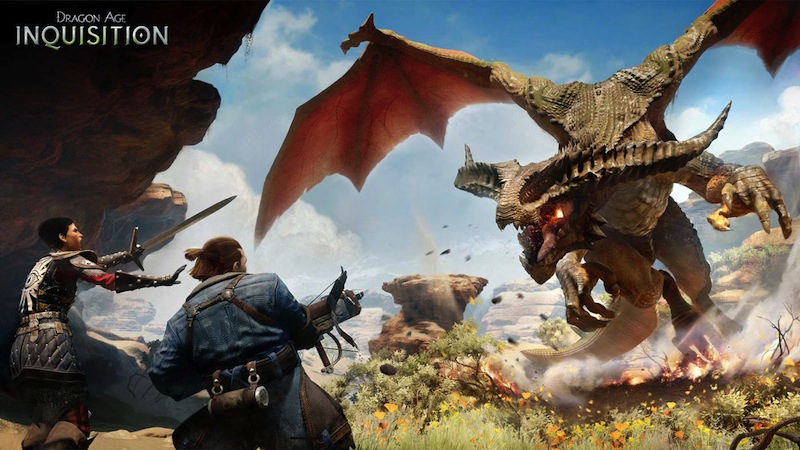Having spent a little over 100 hours playing through Bioware’s latest RPG epic, I can say that Dragon Age: Inquisition is a seriously ambitious attempt to merge character-based storytelling and open-world exploration. As a purely narrative achievement, it’s less successful than its predecessors: the open-world gameplay tends to dilute narrative urgency, and—since the player-character opens the game with no existing ties and no solid contextual grounding—many of the choices the player gets to make during the narrative end up feeling as though they lack heft and meaning. They lack actual weight, since the writing never quite sells, on an emotional level, why any of those choices really matter.
But for all my complaints about its narrative effectiveness—and niggling irritations about gameplay and display, I mean seriously the font size and that menu screen—Dragon Age: Inquisition does at least two things that are the next best thing to revolutionary. And those two things primed me to love it, even despite its flaws.
Contains strong language.
Rather a lot of ink and pixels has been spent on the secondary character of Cremisius “Krem” Aclassi. Krem is a mercenary lieutenant and friend to one of the recruitable characters—The Iron Bull. He’s also a new departure for the Dragon Age setting, because Krem is a trans character: the first trans character if not to exist in the setting, at least the first to exist in a visible fashion. It’s one of the best portrayals—tell the truth, probably the only reasonable good one—of a trans person I’ve seen in a videogame ever, and also among the better I’ve encountered in visual media more generally, and even if this is only a tiny, flawed step forward in terms of representation? It’s still a step forward, and it matters. It mattered a hell of a lot to me to see it.
(Next time, Bioware, let’s have a character like Krem be a recruitable party member, though, k?)
The other thing that Dragon Age: Inquisition does is just about the first thing it does. For the first people with whom the player-character interacts are among the most significant political actors in the player-character’s corner of the map, and certainly among the most significant political actors still alive after the disaster which opens the games. Those people? Cassandra Pentaghast, an impatient, stubborn, and brutally honourable warrior; and Leliana, a mysterious, secretive, and ruthless spy. They’re essentially your first introduction to people in general in Dragon Age: Inquisition, your first guides as to how the world works and who’s in charge of it, and they’ll continue to be important long after the opening scene.
They’re both framed as competent. They’re both framed as mature people. They’re both framed, in their own ways, as leaders—and more than that, as fighting leaders.
They’re both women.
I have, by heaven, never fucking seen the equivalent before in my entire bloody life, I shit you not. Not in games. Not on a television or film screen, either. And bloody hell, the difference it makes. The impression. Right up front, this is a piece of art that acknowledges that women are people. That establishes that women are important. That women matter.
Bioware have always been good at writing excellent characters and presenting both men and women as fully rounded people during the course of their games. But it’s never been right up front before like this before, never an anvil of female competence smashing into your visual cortex in the opening scenes of the narrative.
And damn me if it didn’t nearly make me cry.
For that, I can forgive Dragon Age: Inquisition a hell of a lot.
Liz Bourke is a cranky person who reads books. Her blog. Her Twitter.










